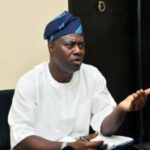Not a few Nigerians were disappointed over the failed nationwide broadcast last Monday, by President Muhamadu Buhari, in respect of providing Nigerians with Presidential update on the COVID-19 pandemic.
Who would blame them, given the fact that at critical stages of the COVID-19 outrage and lockdown responses, he had addressed the country through the nationwide broadcast? Specifically he had done so firstly on Sunday March 29th, secondly on April 13th and thirdly on April 27th, all in 2020.
What would have been the fourth in the series was the one scheduled for last Monday but was botched, and which Presidential spokesman Femi Adesina had explained that “no broadcast was intended hence no broadcast would hold”.
It was the lot of the Chairman of the Presidential Task Force (PTF) on COVID-19, Boss Mustapha to provide updates for the country.
Interestingly, by the time Mustapha gave his brief on Tuesday, he more than made up for whatever disappointment anybody had with Buhari for not delivering the broadcast.
This turn derives from the refreshing prospects that the country may soon see some significant relaxation of restrictions associated with the COVID -19 pandemic. But such will be if Nigerians can adopt some “behavioral changes” within the next two weeks – ostensibly by the beginning of June.
Most Nigerians had expected a relaxation of the lockdown in the botched broadcast. But according to Mustapha, the conditions justifying a relaxation were simply not fulfilled by the response history of Nigerians across the country. Hence the continuation of the restrictions at least until early June, was all that could be offered Nigerians.
The immediate takeaways from Mustapha’s briefing are at least two-fold. Firstly is that the course of rolling back COVID-19 is now thrown back to the ‘good conduct’ of Nigerians.
The second issue is to what can Nigerians make out of Mustapha’s conditional ‘marketing of hope’ to Nigerians, over the ravages of the pandemic, (credit to Bishop Matthew Hassan Kukah, Catholic Archbishop of Sokoto Diocese).
Incidentally, the Federal Government had adopted a five-stage roadmap by which the country can exit the COVID-19 crisis: that is if things work out according to plan. Phase One was to commence on May 18th, Phase Two June 6th, Phase Three June 29th, Phase Four July 20th and Phase Five August 10th.
Furthermore, any signs of danger as in escalation of the incidence of COVID-19 during any of the phases, will attract a reversal of the relaxation of restrictions to the status of the previous phase.
The implication of Mustapha’s briefing in the light of the exit plan is that Phase One had failed, leaving the harsh lesson that many Nigerians are yet to imbibe the culture of caution, and with implications for the future of the lockdown exercises.
But will Nigerians disappoint Mustapha and his PTF? This is most likely, and will be spawned by the odds staked against the ordinary, street level Nigerian, in respect of complying faithfully with the restrictions.
Further clarification on the situation draws from the impact of the measures on various categories of economic activities which define life and death for the citizenry.
For instance, as scheduled in the exit plan, hard pressed artisans and subsistence-grade handymen in the country’s dominant informal sector, whose livelihood is determined by their daily earnings, and who comprise the bulk of Nigeria’s 90 million officially poor, have been indoors since Match 29th, when the lockdown commenced formally, and may remain so until June 29th, before they step out to seek their daily bread.
By implication, the obedient among such Nigerians would have stayed under lockdown for a total of 62 days out of business and circulation, and without palliatives for most of them!
Just as well, public transport at interstate level by road and air, which is the lifeline of the economy, is expected to remain in suspended animation until August when such will return to full activity.
Given the importance of this sector to the economy, it is hardly ingenious that the best that can be achieved is its total lock down for months on end.
Lives that depend on the transportation sector, can be lost even faster than COVID-19 can kill. Even as other businesses such as hotels may wait to reopen between July and August, the public transportation sector should not wait.
Rather some special measures of control can be worked out with respect to passenger and freight holding, can be adopted, to let the country breathe again.
Brilliant as the exit plan is, its acid test borders on how well it fosters the survival of Nigerians in the contemporary circumstances of the country.
For as things stand, COVID-19 has come to stay, and not necessarily as a death sentence. This has led the world to change perception towards strategies for long term stay with it.
This new thinking now rules out any form of prolonged, debilitating stalling of the country, but advocates a new form of constructive engagement between people, their livelihood and the disease, since human productive activities must continue, with or without COVID-19.
For whatever reason, what matters to the legions of hard pressed Nigerians now is how to survive on each new day, not the fear of any impending, possibly avoidable death, from an invisible virus, vicious as it may be.
Unfortunate as this situation is, this is the stark reality of life today in the country.
It is in that context that further restrictions on most Nigerians, compares with imposing death penalty on them.
Hence the impact of whatever relaxation of the COVID-19 related measures by the Mustapha led PTF, which does not address the reopening of interstate transportation, will remain benign.
After several weeks of unplanned, sudden operational hiatus for the transportation sector, Nigeria like a heavily loaded cargo train, has been forced into a screeching halt with more economic, social and even political dislocations than can be casually appreciated.
A wide cross section of the citizenry are not happy, even with full knowledge of the dangers associate with the pandemic. Some are even already reacting with daily increasing audacity to defy the authorities through breaching security procedures and move around the country.
For instance, the recent reports of unauthorized mass movement of able bodied youth from the north to the south, which has been associated with several conspiracy theories of impending terrorist action and or ‘Almajiri’ invasion from the North to the South, must be seen as the early signs of a growing defiance of government restriction orders.
The undeniable liberty with which traveler pass through supposedly locked down highways across the country, and which are manned by armed security personnel, tell of the public take on government restrictions with respect to interstate travel.
Nigeria does not need to wait for a full blown revolt against constituted authority, which is spawned by the obduracy and failure of government agencies, to see things from the more realistic perspective of the masses.

 Join Daily Trust WhatsApp Community For Quick Access To News and Happenings Around You.
Join Daily Trust WhatsApp Community For Quick Access To News and Happenings Around You.


